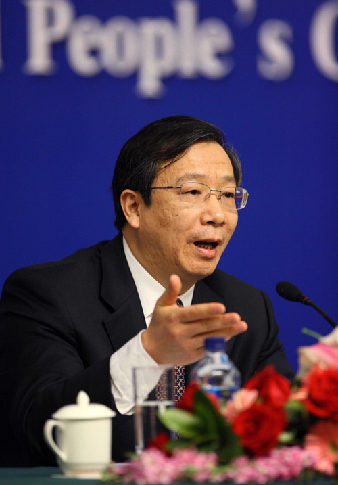|
 |
|
Yi Gang, vice governor of the People's Bank of China and also director of the State Administration of Foreign Exchange, answers questions during a press conference on foreign exchange control and foreign exchange reserve held on the sidelines of the Third Session of the 11th National People's Congress in Beijing, China, March 9, 2010 (XINHUA) |
Investment of China's foreign exchange reserve has seen "relatively good" yields despite global economic woes, while asset safety remains the base line for the country's foreign reserve investment.
"Risk prevention and management is always our priority," Yi Gang, director of the State Administration of Foreign Exchange (SAFE), said Tuesday on the sidelines of the annual session of the National People's Congress (NPC),the country's top legislature.
Yi, also vice governor of the People's Bank of China, the country' s central bank, said China has built a diversified currency portfolio for its foreign exchange reserves, including U.S. dollar, Euro and currencies of some emerging countries. However, he did not specify which currencies.
China has fully considered risk control in the allocation of currencies and assets, and high-risk products such as subprime mortgages and collateralized debt obligations are not included in its investment list, he said.
Yi noted that China succeeded in preserving the general security of foreign exchange reserves in both 2008 and 2009, the most challenging years during the financial crisis.
At the end of 2009, the country's foreign exchange reserves stood at $2.3992 trillion.
In response to a question about changes in China's holding of U.S. treasury bonds, Yi said the U.S. treasury bond market was an important market for China, while both buying and selling of bonds were normal.
According to the U.S. Treasury Department, China held $894.8 billion in U.S. treasury bonds at the end of last year. This figure, revised up from the previous $755.4 billion, means China remains the largest overseas holder of U.S. treasury bonds.
"China's investment in the treasury bonds of the U.S. is based upon market behavior and should not be politicized," he said.
Yi said China would consider "cautiously" investing more of its foreign exchange reserves in gold based on market conditions, however, gold will never be a major investment channel of its huge foreign reserves.
The country's official holding of gold was 1,054 tonnes last year, the fifth largest in the world. As the world's largest gold producer and second largest consumer, China's annual output stands at more than 300 tonnes, and consumption is over 400 tonnes.
Yi repeated the government's stance on the exchange rate issue of renminbi, or the country's currency yuan, saying "China will keep the exchange rate of yuan basically stable at a reasonable and balanced level". He did not elaborate further, but said the country would continue improving the exchange rate formation mechanism of the yuan.
Yi also vowed to step up efforts to stem abnormal cross-border capital inflows, further remove obstacles for the pilot yuan settlement in cross-border trade and steadily advance yuan convertibility under capital accounts.
(Xinhua News Agency March 9, 2010) | 